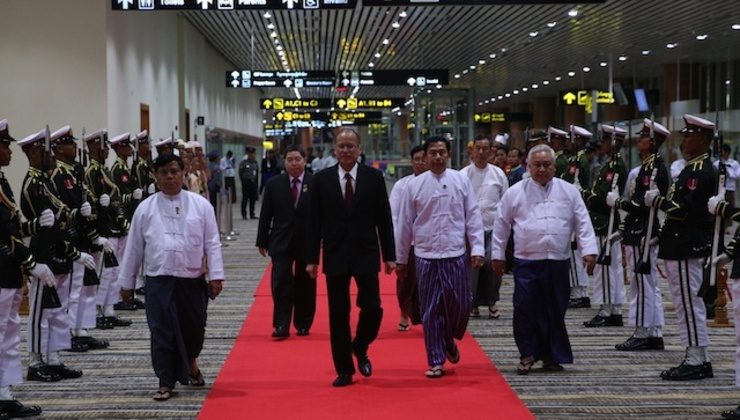SUMMARY
This is AI generated summarization, which may have errors. For context, always refer to the full article.

NAYPYIDAW, Myanmar (UPDATED) – The 25th ASEAN Summit was officially opened as Myanmar President Thein Sein formally welcomed ASEAN leaders one by one to the Myanmar International Convention Center here on Wednesday, November 12.
The Summit was scheduled to begin at 9 am, but Thein Sein did not start his speech until a little before 9:30 am Myanmar time (11 am in Manila). Philippine President Benigno Aquino III was the last of the ASEAN leaders to arrive, at 9:05am.
Aquino landed in Naypyidaw, straight from the APEC Conference in Beijing, at 11:37 pm the night before. (WATCH: 25th ASEAN Opening Summit)
At the opening, Thein Sein emphasized “the importance of our continued efforts to strenghten unity, capacity and resilience to overcome the challenges” in ensuring the success of the ASEAN Community by 2015. He said “nearly 80% of the overall measures due under the three ASEAN Community Bluperints” have been completed, but 20% of the targets remain to be done.
He named natural disasters, global economic uncertainty, the spread of the Ebola virus and extremism as challenges to ASEAN.
Without mentioning China, Thein Sein also highlighted the “need to sustain efforts in promoting the culture of compliance to the established rules and norms of ASEAN and to promote them to a broader extent.”
“Rules-based and Norm-based ASEAN will elevate our stature and transparency which are key to build confidence and trust among ourselves and with our partners. This, in turn, will foster peace, stability and security in the region and beyond, and bring economic development and social harmony,” he said.
The statement comes as urgency intensifies for ASEAN and China to establish a Code of Conduct for the South China Sea (West Philippine Sea), amid increasing maritime disputes in the area.
Thein Sein also praised the ASEAN community for taking a stand on global issues and issuing statements on combating terrorism, condemning the downing of Malaysia Airline Flight MH317, and violent acts of extremism. He also “welcomed the successful outcome of [the] Philippine Government’s Bangsamoro peace agreements.”
Despite this, he said “there is no room to be complacent with our achievements and we should not rest on our laurels made so far.”
“Our Community building is a work in progress. The evolvement of ASEAN Community in 2015 will be a new beginning for a new ASEAN calling for greater unity and integration, enhanced operational efficiency, better coordination, stronger resilience and greater competitiveness of the Community,” he said.
He also welcomed and congratulated Thai Prime Minister General Praytuh Chan O-cha and newly-elected Indonesian President Joko Widodo, both of whom are attending the summit for the first time.
Key issues
At the end of the Summit, ASEAN leaders are expected to adopt the Nay Pyi Taw Declaration for the ASEAN Community’s Post-2015 Vision, the Declaration on Strengthening the ASEAN Secretariat and Reviewing the ASEAN Organs, and the ASEAN Joint Statement on Climate Change 2014.
Another key issue that will be discussed is the strategic positioning of ASEAN amid the shifting geoeconomic and geopolitical regional landscapes.
Aside from establsihing a rules-based ASEAN, Thein Sein made other recommendations to fellow leaders as it gears to enter “the next level of integration as a community,” as listed below:
- Strategize promotion of ASEAN’s central role in region and a greater role in the international arena “by taking more united stands in addressing issues of common concern and interest”
- Sustain economic dynamism by intensifying integration and pursuing sustainable development path
- Enhance resilience and competitiveness within region and with countries beyond the region and strengthen capacity to tackle transnational issues such as climate change, disaster management, food, energy and water security, infectious diseases, preventing violence and extremism, cyber security, drug and human trafficking
- Enhance institutional efficiency, procedural coherence, effective decision making and systematic monitoring, evaluating, reporting and follow up capacity
Along with the 10 member states, heads of state of Australia, Prime Minister Tony Abbott; China, Premier Li Kequiang; India, Prime Minister Narendra Modi; Japan, Prime Minister Shinzo Abe; Korea, President Park Geun-Hye; New Zealand, Prime Minister John Key; Russia, Prime Minister Dmitry Medvedev; and the United States, President Barack Obama are also expected to attend.
Secretary General Ban Ki-Moon of the United Nations, ASEAN Secretary General Le Luong Minh, and Asian Development Bank President Takehiko Nakao are also part of the Summit. – Rappler.com
Add a comment
How does this make you feel?
There are no comments yet. Add your comment to start the conversation.